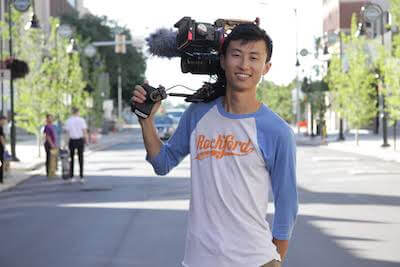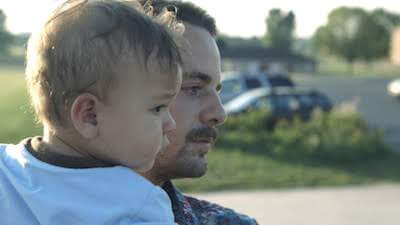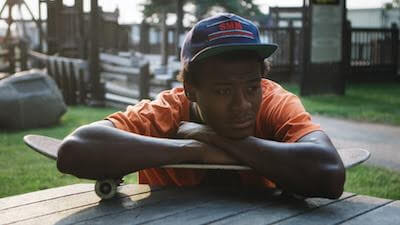By Gretchen Brown | Rewire
You could say Minding the Gap is about skateboarding.
You’d be right, if only by technicality.
The documentary film, set to premiere Feb. 18 on PBS’s “POV,” follows Zack Mulligan, Keire Johnson and Bing Liu over several years as they come to age in Rockford, Illinois.
But filmmaker Liu, 30, turns the camera on himself, as well as Zack’s girlfriend, Nina, and Keire’s family to tell a bigger story of feeling stuck in the Rust Belt, of confronting your past, of feeling like an outsider, of surviving domestic violence.
Skateboarding brings the three men together, a proxy for family in hard times.

Rewire spoke with Liu ahead of the film’s premiere.
Rewire: The documentary is partially about feeling like an outsider, and one of the ways that’s talked about is through Keire. He’s black and has a lot of white friends and is treated like an outsider. Why did you think it was important to include that part of the story?
Bing Liu: That’s such the story of that town, and I think America right now. The conversation around race and class, people very much… see it as a zero-sum game. That’s what is producing divisions right now.
Keire just stood out to me partially because he was the only black skateboarder in this mostly white friend group and this mostly white subculture.
He just talked about how uncomfortable he felt a lot of the time. But at first he was very scared to talk about it. Like he wasn’t sure if it would be like safe… or if he’d, like, get ostracized more for talking about it.
That was one of the things that reminded me of who I was growing up in Rockford. Just learning how to code switch and being really dismissive and internalizing racism, dismissing who you are in order to try to fit in and learning how to come out of that through many things, including, you know, learning that the world is going to treat you a certain way and that your race is going to matter, no matter how you view it.
Rewire: One of the most impactful parts of the film is how your own story is slowly revealed. Why did you decide to include yourself?
BL: I included myself really as a solution for the problem of having this really ethically tangly situation of Nina telling me (during production) that (her boyfriend and Bing’s friend) Zack was being abusive.
I did start to recognize that the films that show the process of the filmmaking help you just get inside the filmmaker’s head. And I think, you know, me deciding to put myself in the film was partly to put skin in the game.
So that eventually when I show the films for the participants, they were all going to be like… “Bing sort of has a stake in this too, he was being vulnerable.” But also to show audience members the way in which I ended up dealing with Nina telling me this thing, because it’s tricky.
There was like a newfound self-awareness of the way that I was acting as the camera person, at a certain point.
Rewire: Were you hesitant to include some of the scenes? For example, at one point, Nina tells you that Zack hits her, but doesn’t want you to confront him. Were you nervous about letting him see that in the film?
BL: At that point she was hesitant mostly because she wanted to save the relationship, which… the film shows part of the reason why it’s so hard for these abusive relationships to end is because you have all these feelings of abuse and love and care of all tangled together.
Ultimately, it wasn’t that I wanted to protect him. I wanted him to be on board with the project because I saw this as an opportunity to look at… why the cycle keeps happening.

If we dismiss people, it’s not going to really help the problem. … We have to sort of find a way to, you know, look at what makes a person do these things.
And so if I got Zack on board with the film… it felt like, you know, there’s still hope for Zack then.
Rewire: One thing you talk with Zack about is why some people are able to break the abuse cycle. Why you, an abuse survivor, were able to go to college and get out of Rockford. It was harder for him. Why do you think that is?
BL: I think we do what we subconsciously or unconsciously know. That’s what ultimately drives so much of our behavior and our view of the world and the way that we go about in this life, sort of like breathing. It’s like we don’t think about it. And I think change takes a lot of work.
I think that’s part of what is Keire’s story, right? It’s such an emotional, internal journey throughout that 90 minutes. And he has to openly bare his soul in a way and really take a hard look at the past. That was really difficult to think about in order to come to terms with his father. But after doing that, I think he felt like he had a lot more autonomy and control in his life.

Whereas I think Zack just didn’t want to do that work. When I asked him what the question is you just described, his answer was very much one of self-defeat. Like I just can’t, I’m not that person, I can’t do that. I think he’s sort of given up on himself.
Rewire: It seems like you’re making a point that looking back or confronting your past is a good way to move forward.
BL: I think it comes down to viewing your life as a story that you have control over, including the past.
I think so much of what happens when you go through a traumatic experience is that you sort of lose a sense of your story, especially your past story. At least for me, it was like a black hole. It was like I couldn’t revisit it… I had this ruptured sense of who I was because of it.
I think part of working on this project and also going to see a therapist and also just writing a lot about my past has produced a lot of pain and a lot of, you know, staying up at night and having f*****-up nightmares.
But at the same time I’m starting to get a sense of, okay, this is who I was when I was growing up and this is why I was making these decisions and these are the results of that. So I think having a framework around revisiting the past is necessary. I don’t think it’s just about sort of blindly going in without any sort of plan or support.
Rewire: What are you most proud of about Minding the Gap?
BL: That it’s really striking a chord with people.
I mean, every day I get a message from a young person from…. Arkansas or something who’s like, “I have been so depressed lately and I feel heard.” Or, “I haven’t talked with my dad for a few years and today was the first time I sat down for dinner and I really tried understanding him.”
It’s a lot of these things that are like, “Oh my God, it’s working, it’s happening.” These immeasurable sorts of shifts, I think, of people’s souls about their experience, about their place and their sense of control of their lives in a way.
I’m just really proud of that. It’s really just making an impact.
![]() This article originally appeared on Rewire
This article originally appeared on Rewire
© Twin Cities Public Television - 2019. All rights reserved.
Read Next



